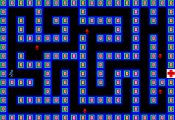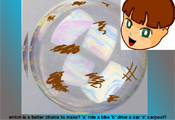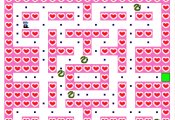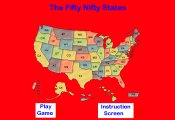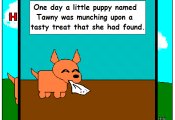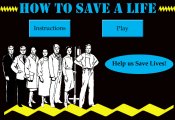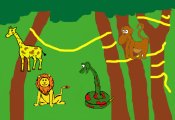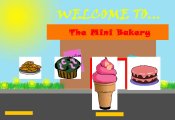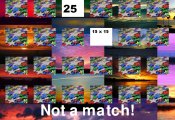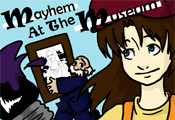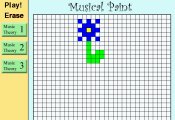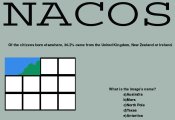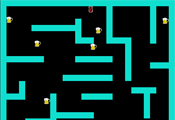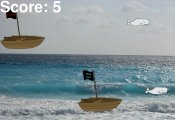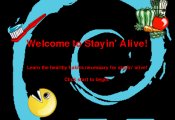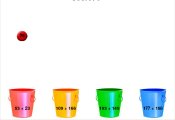Project IT Girl: Difference between revisions
(removed art stuff - all art has been turned in) |
m (→Project IT Girl Program: added NSF funding) |
||
| (10 intermediate revisions by 2 users not shown) | |||
| Line 1: | Line 1: | ||
== Project IT Girl Program == |
== Project IT Girl Program == |
||
Project IT Girl is a [http://www.girlstart.org/ Girlstart] after-school program in Austin, Texas. The program consists of |
[http://www.girlstart.org/itgirl/ Project IT Girl] is a [http://www.girlstart.org/ Girlstart] after-school program in Austin, Texas, funded by the National Science Foundation. The program consists of 44 high school girls (16 - 17 years old) who are learning how to use technology to make a difference in the world over a three-year period. |
||
== "Python with a Purpose" == |
|||
| ⚫ | |||
In the 2007 - 2008 school year, students were given a real-world project with a philanthropic application: develop an educational game that can be distributed to children around the world via the One Laptop per Child program. Over 90% of the girls had no programming experience before this year. |
|||
The Fall 2007 semester curriculum introduced programming concepts and the basics of Python and Pygame as participants worked on a sample educational game about littering, affectionately known as "Don't Mess with Texas" ([http://www.girlstart.org/itgirl/downloads/LitterGame.zip download the sample code]). When participants learned a new programming concept, they immediately applied it to the sample game individually. Each week, participants applied new concepts that increased the functionality of the game, and by the end of the semester the game included a score board, title screen, and various trash and non-trash "sprites." Girls also individually designed a unique educational game ([http://itgirl.wikispot.org/ see the game design documents]). Each girl picked a learning objective for her game that most interested her, from "practice fractions" to "spread awareness of AIDS testing." |
|||
== Watch their progress! == |
|||
* Main project page: http://www.girlstart.org/itgirl/year-two.html |
|||
| ⚫ | |||
Participants in the IT Girl program meet once a week during the fall and spring semesters for 90 minutes in cohorts of 10 - 15 students. The total time of the program over the 2007 - 2008 school year was 91 hours, including field trips, guest speakers, and teaching programming concepts. Of that, only 30 hours was spent programming and testing the girls' individual games during the spring semester. The average participant spent about 24 hours on her game in the spring. |
|||
== Game Development Resources == |
|||
These resources allowed the girls to develop creative games in a short amount of time with limited programming experience: |
|||
| ⚫ | |||
* Cookbook of code snippets or "recipes" used to add functionality to a game: http://itgirl.dreamhosters.com/itgirlgames/cookbook/ |
|||
* Wiki for game designs and project management: http://itgirl.wikispot.org/ |
* Wiki for game designs and project management: http://itgirl.wikispot.org/ |
||
| ⚫ | |||
== Results == |
|||
We are very proud to report that at the end of the program year, 100% of IT Girl participants, individually or in pairs, successfully designed and programmed their own unique game! |
|||
Attitudinal surveys were developed to assess whether the program was successful in promoting and sustaining participants' interest in Computer Science. The following findings emerged: |
|||
# High school girls attracted to the IT Girl curriculum positively associate an interest in computer science with intelligence and creativity. |
|||
# IT Girl was successful in building participant’s confidence that they could succeed academically in Computer Science. |
|||
# IT Girl had a modest impact on enhancing participants’ interest in enrolling in science, math, engineering, or technology courses in high school. |
|||
# IT Girl was highly successful in demonstrating the applications of technology in everyday life and sustaining student interest in the IT Girl program. |
|||
# While external motivations were present for some participants, most girls were motivated to complete their games by intrinsic factors. |
|||
# More than half of the participants chose to work independently on their games, rather than in pairs. |
|||
A multiple-choice test of general programming concepts and Python syntax was created to assess the effectiveness of the IT Girl curriculum in advancing the technological knowledge of high school participants. The following findings emerged: |
|||
# Results showed that high school participants showed gains on all questions of general programming knowledge. |
|||
# Results showed that high school participants showed gains on all questions of Python programming knowledge. |
|||
# Participants had mixed feelings about programming after completing Year 2 of the program. |
|||
== Finished Games == |
|||
The following games are eligible for the XO laptop, meaning they use only materials (sounds, images, etc) in the public domain or under the Creative Commons license. Each game includes a credits.txt file with attributions for materials used. Other girls' games used copyrighted material found on the internet. All code is licensed under the GPL. |
|||
These games have NOT been tested on the XO laptop. There are many known issues in the games, including high CPU usage. |
|||
{| class="wikitable" |
|||
|- |
|||
| [[Image:AIDS Maze screenshot.jpg]]<br />[http://itgirl.dreamhosters.com/itgirlgames/games/FrancesD%20and%20AlyssaH/ AIDS Maze] |
|||
| [[Image:Bubble screenshot.jpg]]<br />[http://itgirl.dreamhosters.com/itgirlgames/games/BrandisB/ Bubble] |
|||
| [[Image:El viaje screenshot.jpg]]<br />[http://itgirl.dreamhosters.com/itgirlgames/games/JinAC/ El viaje de Paco por Amor] |
|||
| [[Image:Fifty Nifty States screenshot.jpg]]<br />[http://itgirl.dreamhosters.com/itgirlgames/games/JordanA/ The Fifty Nifty States] |
|||
|- |
|||
| [[Image:Get a Clue screenshot.jpg]]<br />[http://itgirl.dreamhosters.com/itgirlgames/games/SarahS%20and%20KortniL/ Get a Clue!] |
|||
| [[Image:Homework Rush screenshot.jpg]]<br />[http://itgirl.dreamhosters.com/itgirlgames/games/KatyM/ Homework Rush] |
|||
| [[Image:How to Save a Life screenshot.jpg]]<br />[http://itgirl.dreamhosters.com/itgirlgames/games/KaylaR/ How to Save a Life] |
|||
| [[Image:Jungle Math screenshot.jpg]]<br />[http://itgirl.dreamhosters.com/itgirlgames/games/VictoriaV%20and%20ZoeG/ Jungle Math] |
|||
|- |
|||
| [[Image:Let's Bake screenshot.jpg]]<br />[http://itgirl.dreamhosters.com/itgirlgames/games/VanessaW%20and%20TandraH/ Let's Bake!!] |
|||
| [[Image:Math Concentration screenshot.jpg]]<br />[http://itgirl.dreamhosters.com/itgirlgames/games/KaelieG/ Math Concentration] |
|||
| [[Image:Mayhem at the Museum screenshot.jpg]]<br />[http://itgirl.dreamhosters.com/itgirlgames/games/AudreyL/ Mayhem at the Museum] |
|||
| [[Image:Musical Paint screenshot.jpg]]<br />[http://itgirl.dreamhosters.com/itgirlgames/games/BrianaF/ Musical Paint] |
|||
|- |
|||
| [[Image:NACOS screenshot.jpg]]<br />[http://itgirl.dreamhosters.com/itgirlgames/games/LoraF/ NACOS] |
|||
| [[Image:Road Trip screenshot.jpg]]<br />[http://itgirl.dreamhosters.com/itgirlgames/games/AmandaS/ Road Trip] |
|||
| [[Image:Save the Whales screenshot.jpg]]<br />[http://itgirl.dreamhosters.com/itgirlgames/games/CarolineS/ Save the Whales] |
|||
| [[Image:Stayin Alive screenshot.jpg]]<br />[http://itgirl.dreamhosters.com/itgirlgames/games/HannahL/ Stayin' Alive] |
|||
|- |
|||
| [[Image:Swappin Color screenshot.jpg]]<br />[http://itgirl.dreamhosters.com/itgirlgames/games/LeahY/ Swappin' Colors] |
|||
| |
|||
| |
|||
| |
|||
|} |
|||
Latest revision as of 19:57, 11 June 2008
Project IT Girl Program
Project IT Girl is a Girlstart after-school program in Austin, Texas, funded by the National Science Foundation. The program consists of 44 high school girls (16 - 17 years old) who are learning how to use technology to make a difference in the world over a three-year period.
"Python with a Purpose"
In the 2007 - 2008 school year, students were given a real-world project with a philanthropic application: develop an educational game that can be distributed to children around the world via the One Laptop per Child program. Over 90% of the girls had no programming experience before this year.
The Fall 2007 semester curriculum introduced programming concepts and the basics of Python and Pygame as participants worked on a sample educational game about littering, affectionately known as "Don't Mess with Texas" (download the sample code). When participants learned a new programming concept, they immediately applied it to the sample game individually. Each week, participants applied new concepts that increased the functionality of the game, and by the end of the semester the game included a score board, title screen, and various trash and non-trash "sprites." Girls also individually designed a unique educational game (see the game design documents). Each girl picked a learning objective for her game that most interested her, from "practice fractions" to "spread awareness of AIDS testing."
During the Spring 2008 semester, IT Girls implemented their game designs using Python, Pygame, and several resources such as Game_templates.
Participants in the IT Girl program meet once a week during the fall and spring semesters for 90 minutes in cohorts of 10 - 15 students. The total time of the program over the 2007 - 2008 school year was 91 hours, including field trips, guest speakers, and teaching programming concepts. Of that, only 30 hours was spent programming and testing the girls' individual games during the spring semester. The average participant spent about 24 hours on her game in the spring.
Game Development Resources
These resources allowed the girls to develop creative games in a short amount of time with limited programming experience:
- Code templates of basic game types to get started: http://itgirl.dreamhosters.com/itgirlgames/templates/
- Cookbook of code snippets or "recipes" used to add functionality to a game: http://itgirl.dreamhosters.com/itgirlgames/cookbook/
- Wiki for game designs and project management: http://itgirl.wikispot.org/
Results
We are very proud to report that at the end of the program year, 100% of IT Girl participants, individually or in pairs, successfully designed and programmed their own unique game!
Attitudinal surveys were developed to assess whether the program was successful in promoting and sustaining participants' interest in Computer Science. The following findings emerged:
- High school girls attracted to the IT Girl curriculum positively associate an interest in computer science with intelligence and creativity.
- IT Girl was successful in building participant’s confidence that they could succeed academically in Computer Science.
- IT Girl had a modest impact on enhancing participants’ interest in enrolling in science, math, engineering, or technology courses in high school.
- IT Girl was highly successful in demonstrating the applications of technology in everyday life and sustaining student interest in the IT Girl program.
- While external motivations were present for some participants, most girls were motivated to complete their games by intrinsic factors.
- More than half of the participants chose to work independently on their games, rather than in pairs.
A multiple-choice test of general programming concepts and Python syntax was created to assess the effectiveness of the IT Girl curriculum in advancing the technological knowledge of high school participants. The following findings emerged:
- Results showed that high school participants showed gains on all questions of general programming knowledge.
- Results showed that high school participants showed gains on all questions of Python programming knowledge.
- Participants had mixed feelings about programming after completing Year 2 of the program.
Finished Games
The following games are eligible for the XO laptop, meaning they use only materials (sounds, images, etc) in the public domain or under the Creative Commons license. Each game includes a credits.txt file with attributions for materials used. Other girls' games used copyrighted material found on the internet. All code is licensed under the GPL.
These games have NOT been tested on the XO laptop. There are many known issues in the games, including high CPU usage.
